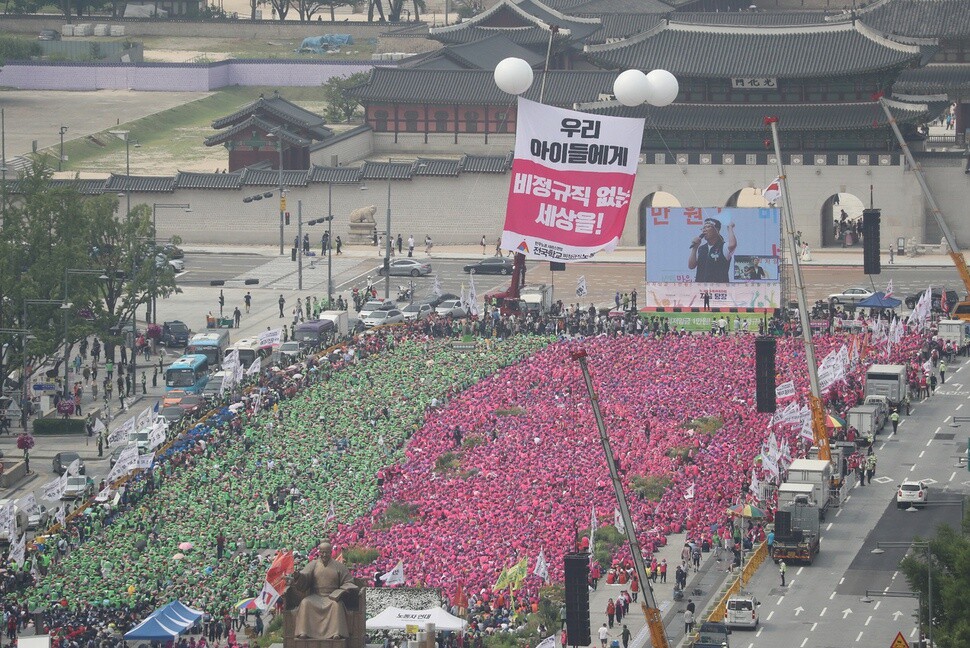hankyoreh
Links to other country sites 다른 나라 사이트 링크
[Editorial] Social dialogue needed for real solution to irregular work and polarization

A large-scale general strike was organized in June by Collective Action for a 10,000-Won Minimum Wage and the Abolition of Irregular Work, an organization with the Korean Confederation of Trade Unions (KCTU) and around 70 civic groups taking part. After preliminary demonstrations in central Seoul, they gathered at Gwanghwamun Square in the afternoon for a main rally attended by 50,000 people (according to the organizers’ estimates) demanding a minimum wage of 10,000 won (US$8.73), abolition of irregular work, and the right to union activities. Police sent in a security force of around 6,000, but no major clashes occurred. Thinking about the vicious cycle seen at past demonstrations with this kind of scale - where a segment of the demonstrators has tended to become more extreme once the vehicle barricades and water cannons showed up - really brought home how times have changed.
The ones spearheading this latest general strike weren’t the unions for regular workers at South Korea’s large corporations. Instead, they were around 100,000 irregular workers affiliated with KCTU, including school staff, university hospital cleaning staff, construction workers, and electronics repair workers. Support was provided by social campaign groups, young people, and part-time workers. KCTU described it as a “societal” general strike, emphasizing its status as the first general strike by irregular workers. Some critics blasted it as “the new administration’s bill for the candles” or a “strike without a cause,” stressing the inconveniences it caused for school meals and traffic. But a general strike like this one is a legitimate exercise of worker rights. Most of the participating union members achieved the right to strike through negotiation with their respective employers and labor relations board arbitration.
Irregular workers at schools complaining that their base pay never changes, whether they work for one year or ten. Indirectly employed workers who want to negotiate with the company that is actually employing them. Part-time workers who want to see a world when they are not looked down upon. All of these demands are pressing issues that will require attention from a society that has reacted all too passively to the way polarization and the irregular employment issue have deteriorated over the past nine years. A “society where labor is respected” is also one of the Moon Jae-in administration’s defining orientations.
But the labor side will also need to work harder at achieving broader social support on these areas, rather than demanding that they be solved all at once. Blame for the Minimum Wage Commission’s failure on June 30 to reach an agreement on next year’s minimum wage before the legal deadline passed can be laid first at the feet of employer representatives on the commission who opposed a hike. But it’s also true that measures haven’t been devised yet for the small-scale factory and mom-and-pop business owners who will bear the brunt. With so many different stakeholders involved in such complex ways, we can’t have a general strike every time we need to find a solution. With the Moon administration’s arrival, an avenue toward social dialogue has been created with the commission on job creation. We need to make sure not to let up in our efforts toward dialogue.
Please direct questions or comments to [english@hani.co.kr]

Editorial・opinion
![[Column] Has Korea, too, crossed the Rubicon on China? [Column] Has Korea, too, crossed the Rubicon on China?](https://flexible.img.hani.co.kr/flexible/normal/500/300/imgdb/original/2024/0419/9317135153409185.jpg) [Column] Has Korea, too, crossed the Rubicon on China?
[Column] Has Korea, too, crossed the Rubicon on China?![[Correspondent’s column] In Japan’s alliance with US, echoes of its past alliances with UK [Correspondent’s column] In Japan’s alliance with US, echoes of its past alliances with UK](https://flexible.img.hani.co.kr/flexible/normal/500/300/imgdb/original/2024/0419/2317135166563519.jpg) [Correspondent’s column] In Japan’s alliance with US, echoes of its past alliances with UK
[Correspondent’s column] In Japan’s alliance with US, echoes of its past alliances with UK- [Editorial] Does Yoon think the Korean public is wrong?
- [Editorial] As it bolsters its alliance with US, Japan must be accountable for past
- [Guest essay] Amending the Constitution is Yoon’s key to leaving office in public’s good graces
- [Editorial] 10 years on, lessons of Sewol tragedy must never be forgotten
- [Column] A death blow to Korea’s prosecutor politics
- [Correspondent’s column] The US and the end of Japanese pacifism
- [Guest essay] How Korea turned its trainee doctors into monsters
- [Guest essay] As someone who helped forge Seoul-Moscow ties, their status today troubles me
Most viewed articles
- 1[Column] The clock is ticking for Korea’s first lady
- 2Samsung barricades office as unionized workers strike for better conditions
- 3After 2 months of delayed, denied medical care, Koreans worry worst may be yet to come
- 4[Correspondent’s column] In Japan’s alliance with US, echoes of its past alliances with UK
- 5[Column] Has Korea, too, crossed the Rubicon on China?
- 6Hong Se-hwa, voice for tolerance whose memoir of exile touched a chord, dies at 76
- 7All eyes on Xiaomi after it pulls off EV that Apple couldn’t
- 8US overtakes China as Korea’s top export market, prompting trade sanction jitters
- 9[Photo] Smile ambassador, you’re on camera
- 10[Guest essay] How Korea turned its trainee doctors into monsters